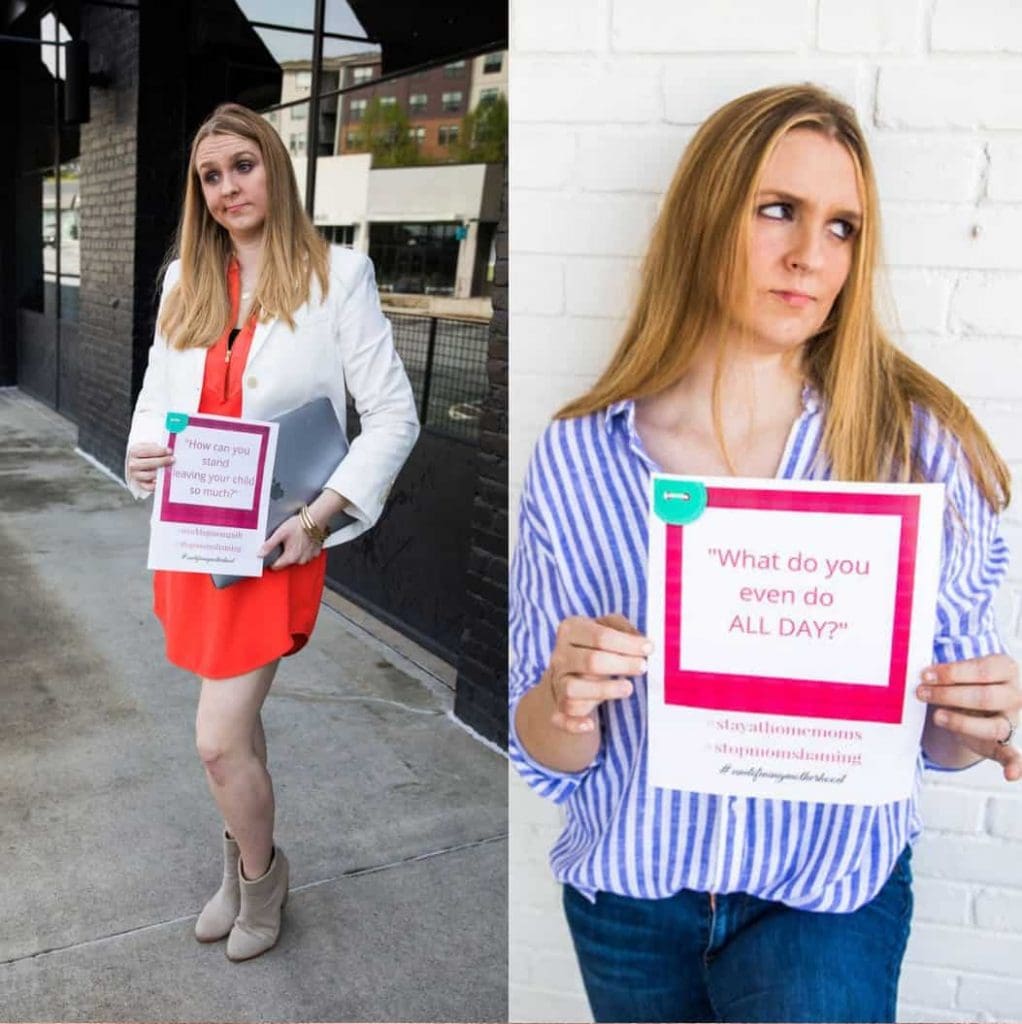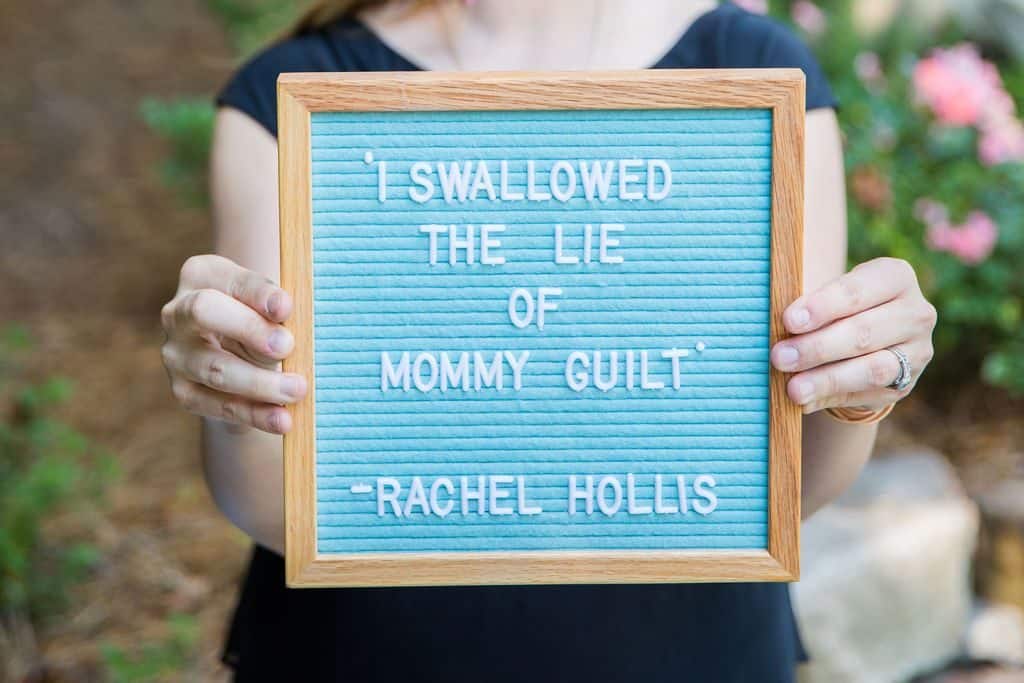Mom guilt is hard, it’s real, it’s constant. It makes us all feel bad.
We all experience parenting guilt. If you don’t, please, I beg of you, share the wisdom of your ways.
But here’s the thing you need to know: it’s a total lie, and we all constantly fall prey to it. Let’s talk about how we can overcome it.

Working moms are asked, “How can you stand leaving your kids so much?” Stay-at-home-moms (SAHMs) get the constant question, “What do you even do all day?” Both questions are bullshit.
Whether you’re feeling working mom guilt or stay-at-home-mom guilt, the fact remains, you can’t make everyone happy. There’s no way to get it right.
So you have nothing to feel guilty about. Mom guilt, my friend, is a LIE!

This site contains affiliate links, meaning that we earn a small commission for purchases made through our site. We only recommend products we personally use, love, or have thoroughly vetted.
What Is Mom Guilt?
Mom guilt is a feeling. While guilt is defined in the Oxford English Dictionary as “a failure of duty,” mom guilt is a failure of perceived duty.
It’s the feeling that you’re not living up to unrealistic expectations that are set for parents.
These expectations have been engrained in us our entire lives. As guest author Shelby said when discussing working mom guilt, “We’re females in the 21st century. We’ve got to feel guilty about something!” Touché, Shelby.
Types of Guilt
Molly Millwood, PhD, is a psychologist who regularly works with new and seasoned mothers as they attempt to overcome guilt and shame about parenting.
In her influential book, To Have and To Hold, she tackles the subject of guilt on many levels, making one important distinction that I believe can help us understand the mommy guilt parents feel.
Millwood draws a distinction between two types of guilt:
- “Valid guilt–the informative, constructive kind that signals to us that we’re behaving in a way that is out of alignment with our values or intentions.”
- “Unfounded guilt,” which “arises from perfectionism of low self-worth or any number of unrealistic measurements or standards we’ve internalized.”
Mom guilt, in most cases, is unfounded guilt!
When we feel guilty for leaving our kid’s ball game early for a meeting, leaving them so we can spend time on self care, letting them watch too much TV when we’re working from home during quarantine–these are unfounded feelings of mom guilt.
Why unfounded? Because we went to the game in the first place. Because we can’t care for our children without also caring for ourselves. Because quarantine equals survival mode, and we just need to get by!
Because the lives people show you on social media are curated lives, so all those people you think are totally rocking this whole motherhood thing–well, they’re experiencing mommy guilt too!
We can’t live up to their curated lives, and we need to stop trying.
Why Do We Experience Mommy Guilt?
I’m going to try not to get on a soap box here.
We experience mom guilt because we’ve been conditioned to believe that we’re supposed to be naturally nurturing caretakers to our children.
Women have been socialized since the day they were born to believe they’re supposed to naturally know how to parent. And you know what no one “naturally” knows how to do? Care for a child who’s driving you up the wall!
No wonder parents in the world constantly experience feelings of inadequacy!
To understand why you specifically experience mom guilt, you need to pinpoint your personal triggers–the sources that most often cause your guilt.
My Sources of Mom Guilt
I have so many sources of mom guilt that it’s crazy.
Because of my experience with success after recurrent miscarriage, I falsely believe that I should relish every moment of motherhood.
After all, I worked so hard to get here, and I know so many women who desperately want to be here.
But no one can relish every moment of motherhood, and I think that’s a major source of guilt for us all.
When looking back on our maternal experiences, our brains inherently shut out many of the dark moments. This means that older parents tell us of the beauty and magic of raising a child. When we don’t feel that magic, we feel guilty, shameful, like we’ve done something wrong.
We feel alone, when in actuality, we’re just like everyone else, including those people telling us stories about how much we should enjoy this time.
Working mom guilt is also a MAJOR source of guilt for me. I work from home full time, which means I can hear Jack asking for me.
He knows I’m in the house while someone else puts him down to nap. And I feel like a terrible human 5 days out of 7 because of that.
My mom chose to stay home with my brother and me, so some part of me believes not that I should do the same, but that I should want to do the same.
Yet a 6 month maternity leave was 5 months too many for me. I realized that I am NOT made to be a stay at home mom. It’s a crazy hard job, and I am simply not cut out for it.
But I feel guilt for feeling that way.
Even while I do important work that helps other women everyday, I feel guilty for not wanting to drop it all and just care for my child.
Blame Other People. Seriously.
I hope what you see from my above explanations is that my triggers for guilt aren’t actually about me doing anything wrong–they’re about me making choices that are best for me!
We’ve been socialized to believe that mothers should be fully self sacrificing, so when we do anything for ourselves (even if our time with our children is of higher quality for it), we often feel guilty.
And it’s a damned lie! For your mental health, please understand that mom guilt is such a miserable lie!

And to overcome it, we need to learn our triggers, the sources of our guilt.
Here are some tips for figuring out yours:
- What subjects tend to put you on the defensive when other’s bring them up?
- What do you find yourself trying to explain away to others that they try to guilt you about?
- What subjects do people in your life send passive aggressive messages about, suggesting you can do better?
These things likely represent many of your sources of mom guilt. And once we know what’s causing our guilt, we can start working to overcome it.
Click below to get our worksheet for overcoming mom guilt!
Parenting Guilt Is Not A Two-Way Street
Seriously, mamas. I need you to hear me on this one.
I keep saying that we’ve been taught to feel guilt, that we’ve been socialized to believe we should behave a certain way, and there’s so much research to support those claims!
Let me quote just one example of this research:
“Guilt, shame, pride, and embarrassment are moral emotions, which motivate adherence to social norms and personal standards . . . . women experience more guilt, shame, and embarrassment.”
Nicole M Else-Quest, Ashley Higgins, Carlie Allison, Lindsay C Morton
This is why we talk about mom guilt so much more than dad guilt.
If I leave Jack with Husband so I can have alone time, I feel guilty. Meanwhile, Husband enjoys having time with his son, and Jack loves spending time with his dad.
I have no reason to feel guilty, but I do.
But when Husband leaves Jack alone with me, he thinks nothing of it. Part of parenthood is coming and going and negotiating responsibilities, and he feels no guilt for being away.
But I do. Because many moms feel guilt more than dads do, and many women feel guilt more than men do.
Some research indicates this is partially due to the empathic nature of our brains, but most suggests this excess guilt is due to norms we’ve internalized that tell us we should consistently self-sacrificing for our children.
How Do I Deal With My Mom Guilt?
To overcome mom guilt, there are a number of things we all need to do.
- Recognize that it’s a lie
- Practice distinguishing between valid guilt and unfounded guilt
- Learn from valid guilt, and adjust our behaviors so we experience it less often
- Talk back to unfounded guilt (e.g. “Dear mind, I recognize that you feel guilty for going to work, but that’s not a helpful emotion, and it’s nothing to feel guilty about. Work serves your family. Work serves your soul. Work helps give you a strong sense of self, which is an important value you want to teach your children. Work helps you demonstrate that value. So while I’ll be careful not to overwork, I need you to understand that this simply is not something to feel guilty about. I know you’ll bring the guilt back, and I’ll see you when you do. But I’m going to release you now”).
I know this last part sounds insane, but I swear it works! Not immediately, but over time.
A huge part of overcoming mom guilt is training your mind not to let unhelpful intrusive thoughts enter.
For help learning how to do this, download and repeat our 4-step exercise for overcoming mom guilt.

Should I Seek Professional Help to Overcome Mom Guilt?
In most cases, professional counseling is not necessary for overcoming mom guilt. That being said, I think we could all benefit from therapy, so I never discourage it.
But as Millwood says, “I spend a good deal of my time as a therapist looking at guilt with my clients, helping them wrangle it when it’s an unwieldy and persistent presence in their lives.”
These words stand out to me: “unwieldy” and “persistent.”
If these words describe your guilt, then I highly recommend seeking professional help. If your guilt encumbers your ability to live and enjoy most of your life, then I recommend seeking professional help.
What do you say to your therapist when you do seek help?
That’s up to you and your comfort level with therapy. But as someone who’s seen the same therapist regularly for well over a decade, I would probably walk in, plop down on the couch and say, “I’m struggling with guilt, and I don’t know how to overcome it. Let me tell you about the last few times I felt guilty when I don’t think I should have.”
I’d tell me story, then turn the floor over to my therapist. And from there, my life would begin to drastically improve.
Mom Guilt Is A Lie
This is the main takeaway I hope you get from this article. Mom guilt, for all the good it may serve in the few instances when it’s valid guilt, is almost entirely a lie.
We don’t need to live up to other’s expectations, and we need to recognize that our own expectations of ourselves are shaped by others, whether we mean for them to be or not.
We need to set realistic expectations for ourselves and learn to live according to those.
Don’t worry if you don’t live up to others’ abilities to easily raise children. Those people don’t live up to the expectations they set either!
We must realize that what we see on social media is not real life, and what friends tell us often still is not real life.
“I’m fine,” most friends tell us. “Hanging in there.” Only when we’re very lucky do we get to hear the real, deep struggles, and understand that we are absolutely not alone.
Stop Guilting Moms!
We can work on overcoming mom guilt on our own, but if we’re being honest, there HAS to be a cultural shift, as well. So please, for the love of God, just stop guilting moms!
I’m glad bottle feeding made your life easier. Yes, it might have made my postpartum experience easier, too. But you didn’t have to spend one of the hardest periods of my life telling me that I would enjoy postpartum if only I weren’t breastfeeding.
I love that you want to stay at home with your children. Staying home with my child made me miserable. I’m not made for it. Please don’t remind me that you disagree with my choice. Please don’t tell me what I’m missing. I’m a better mother for not doing it all day every day. You can be a better mother for staying home. We don’t have to do things the same way to be good moms.
I’m sorry to those of you who do want to stay home, but whose circumstances don’t allow that opportunity. Even when you love your job, leaving your child is hard. And even though you love your child, staying home with them is hard, too!
And to those of you who do choose to stay home, HERE’S TO YOU, MAMAS! That mess is exhausting to me, and I applaud you with my whole heart.
There’s No Winning With Mom Guilt
The point is, there is absolutely no winning here.
We can only set ourselves free if we stop judging each other, listening to judgment from others, and holding ourselves to unreasonable standards.
Let me be clear about one thing.
Reminding moms that you are/were better is your own way of trying to validate your choices. It has nothing to do with the mom you’re judging.
Even though your judgment sticks with her in ways you’ll never know. You can read more about this kind of judgement in Hannah’s article, “I’m a Good Mom No Matter My Parenting Style.”
So stop it already. Stop the mom judging and stop the mom guilting. We all do it–I do it too–and I consciously try to remember not to.
Forgive yourself when you do it. You should also give a sincere apology, but recognize this tendency in yourself and work to not do it anymore.
Tell us about your experience with mom guilt in the comments!
General FAQ
Mom guilt is a failure of perceived duty. It’s the feeling that you’re not living up to unrealistic expectations that are set for parents.
Women have been socialized to believe they’re supposed to naturally know how to parent, so when it’s hard, or we do something that isn’t what we think we’re “supposed” to do, we feel guilty.
We all have personal triggers–the sources that most often cause our guilt. These triggers generally stem from ideals we learned in childhood and expectations we gleam from media (including social media).
The fact that you’re asking this question already indicates that you’re a good mom. If you’re trying your best, loving your kids, learning to understand your child(ren) everyday, you’re very likely a good mom.












Thank you so much for sharing! I am constantly struggling with “mom guilt”, first when I was working full time and felt like I was missing out, then when I decided to be a full time mom and realized it was so incredibly hard and wishing I could be completely fulfilled by motherhood like I was ” supposed ” to be. I have finally accepted that it’s ok for me to want to work, but I still can’t shake the feeling that I wish I were different because it would somehow be better for my daughter. I really like your point about it really being a problem of mom shaming. Those feelings didn’t arise until I heard others commenting on how much quality time I was missing by working, or how much they wished they could stop working and be with their children. I find it so ridiculous that people have this expectation that all mothers can be completely fulfilled by this one thing, motherhood, when that is not even hinted at for men. Can you imagine telling a man that once he became a dad it was time to forget about all the other things in his life (hobbies, work, relationships) . Yet you see that expectation for women all the time and creates this never ending guilt cycle.
You’re absolutely right. My husband is swamped, but he doesn’t receive nearly the criticism or shaming that I do for not spending enough time with Jack, even though I am with Jack so much more than he is.
These are some great tips! I think mom guilt is BS in general and made a podcast episode about this to empower others. https://podcasts.apple.com/us/podcast/mom-guilt-is-bull-sh-t/id1506416980?i=1000473342276